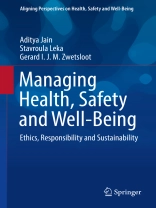To achieve sustainable progress in workplace and societal functioning and development, it is essential to align perspectives for the management of health, safety and well-being. Employers are responsible for providing every individual with a working environment that is safe and does not harm their physical or mental health. However, the current state of the art indicates that approaches used to promote health, safety and well-being have not had the anticipated results. At the level of the enterprise it is widely understood and accepted by all stakeholders that employers share the responsibility of promoting and managing the health of their workers. Evidence indicates that most employers put in place procedures and measures to manage workers’ health and create healthy workplaces to meet legal requirements, as a response to requests by employees, as a need to improve company image/reputation, and to improve productivity. This highlights that in addition to legal requirements, the keydrivers for companies also include the ethical and business case. While much has been written about role of legislation and the business case for promoting health, safety and well-being, not much is known about the ‘ethical case’ for promoting employment and working conditions. In this context, this book examines the potential of the link between responsible and sustainable workplace practices, human rights and worker health, safety and well-being and explores how complementary approaches can be used to promote employment and working conditions and sustainability at the organizational level. It offers a framework for aligning different approaches and perspectives to the promotion of workers’ health, safety and well-being and provides recommendations for introducing such an approach at the enterprise level.
Tabella dei contenuti
Chapter 1. Work, Health, Safety and Well-Being: Current State of the Art.- Chapter 2. Approaches to Managing Health, Safety and Well-Being.- Chapter 3. The Economic, Business and Value Case for Health, Safety and Well-Being.- Chapter 4. Responsible and Ethical Business Practices and their Synergies with Health, Safety and Well-Being.- Chapter 5. The Fundamental Human Right to Health, Safety and Well-Being.- Chapter 6. Mainstreaming Health, Safety and Well-Being.- Chapter 7. Aligning Perspectives and Promoting Sustainability.
Circa l’autore
Aditya Jain is Assistant Professor in Human Resource Management at the Nottingham University Business School and a member of the Centre for Organisational Health and Development. He is the Executive Officer of the European Academy of Occupational Health Psychology, Associate Editor of the journal ‘Safety Science’ and a member of the British Standards Institution’s ‘Health & Safety Committee’ and ‘Human Capital Committee’. His expertise lies in enhancing organisational productivity, quality, innovation and workers’ well-being, all of which are linked to the way work is designed and the way in which organisations are managed. His work has focused on examining the role of softer forms of policy, such as voluntary standards, social dialogue and business responsibility and sustainability initiatives in the area of managing employment and working conditions. He has published over 50 journal articles, book chapters, reports and guidance, and presented his work at numerous internationalconferences.
Stavroula Leka is Professor of Work, Health & Policy at the University of Nottingham and Director of the Centre for Organizational Health & Development, a World Health Organization collaborating centre in occupational health. She is Associate Fellow of the British Psychological Society, and Fellow of the Royal Society for Public Health, and of the Higher Education Academy. She chairs the scientific committee ‘Work Organisation & Psychosocial Factors’ of the International Commission on Occupational Health. She received an early career achievement award by the American Psychological Association for outstanding contribution in occupational health psychology and the study of work-related stress. Her expertise lies in the translation of occupational health and safety knowledge and policy into effective practice, with key themes being work organisation and the management of the psychosocial work environment for business and societal sustainability; and the promotion of mental health in the workplace. She is editor of two book series and has published over 50 scientific papers in addition to 10 books, 30 book chapters and numerous reports and guidance documents. She sits on the editorial boards of the International Journal of Stress Management, Safety & Health at Work, and Policy & Practice in Health & Safety, and is Associate Editor of Safety Science.
Gerard I.J.M. Zwetsloot Ph D is director of Gerard Zwetsloot Research & Consultancy (NL), and is Honorary Professor in Occupational Health and Safety Management at the University of Nottingham (UK). He has previously worked at the Netherlands Organisation for Applied Scientific Research TNO as a senior research scientist, and was special professor at Erasmus University Rotterdam. He is interested in innovative approaches management and policy in health safety and well-being at work, in ‘mainstreaming’ occupational health and safety management into business operations, and to integrate the value of health and safety into organisational and national cultures. He regards occupational health and safety management an essential aspect of corporate social responsibility. He published more than 35 papers in international journals; some of his publications have been translated into Chinese, German, Finnish, French, Italian, Polish and Spanish. He is member of the editorial board of the International Journal of Occupational Safety and Ergonomics, and of Policy and Practice in Health and Safety.












